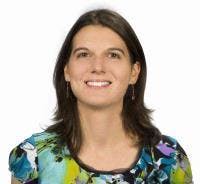Ariana Hargrave: ‘Be Fearless’
Ariana Hargrave’s dad taught her to solder when she was young. He also taught her to be fearless and not be afraid of learning difficult things. She now shares that same advice with other engineers as she teaches SEL University protection courses.
Hargrave has taught a wide array of SEL University protection courses ranging from theory to application and testing. Her favorites are the courses on applying protective relays on substation equipment: APP-487E, APP-487V, and APP-487B. She is also the course owner for PROT-300 and APP-751. She will be teaching APP-751 in August in Corpus Christi, Texas.
T&D World discussed with Hargrave her love of power and system protection and the importance of connecting with students.
Being an application engineer is the best job in the world. Our customers are always bringing us challenges to solve or asking technical questions about our products. We really need to know the products inside and out in order to answer their questions and solve their problems. This really helps when we teach classes, because we know the products so well and we know what areas confuse people. It also makes it easy to give practical examples of the topics we are teaching.
Q: When and why did you decide to go into electric power?
I've always been interested in electronics. My freshman year of college, I studied microprocessors and thought I was going to become an electronics engineer. It wasn't until my sophomore year when I got an internship at the local electric utility by complete chance. There, I absolutely fell in love with power and system protection and haven't looked back since.
Q: Best thing about your job right now?
I am constantly helping people learn how to solve problems. When something goes wrong, they call me, and it feels great to be able to help. Personally, I really love writing, and explaining something technical through an application guide, event report write-up, or a technical paper is my favorite part of the job. I always have one or more technical documents "in the works."
Q: What’s the most important thing you’ve learned in your past experience that you want to communicate to students or participants?
Just because something looks overwhelming and difficult doesn't mean you can't master it. Take it in bite-sized pieces.Think logically, and don't be afraid to read the instruction manual.
Q: Why are protection courses important?
Our classes teach students how to understand and apply protective relays. Our students need these classes because when the lights go out at 2 a.m., what do you do? You have this blue box in front of you and you have to get power restored. If you have no idea how it works, you're not going to be very effective.
Q: What do you like to do in your spare time?
I love doing things with my hands: building furniture, fixing cars, and other DIY-type activities. Building and fixing things yourself gives a great feeling of accomplishment. Although my hobbies are definitely different from my day job, they still revolve around solving problems.
Q: Anything else you would like to add about your teaching philosophy?
It is so important, when teaching, to explain things at the students' level. You can be the smartest person in the room, but if you can't teach what you know effectively to where people understand it, then the end goal isn't accomplished. I always try my best to gauge where my audience is skill-wise, and teach to that level.

